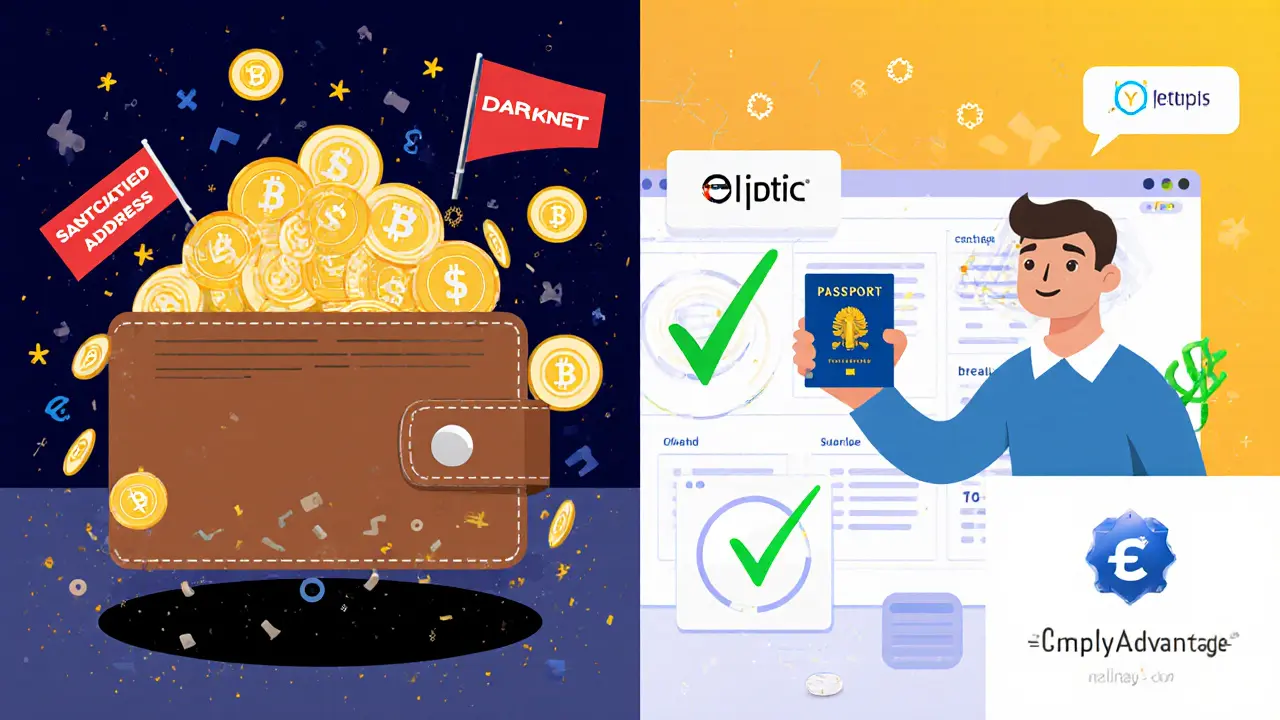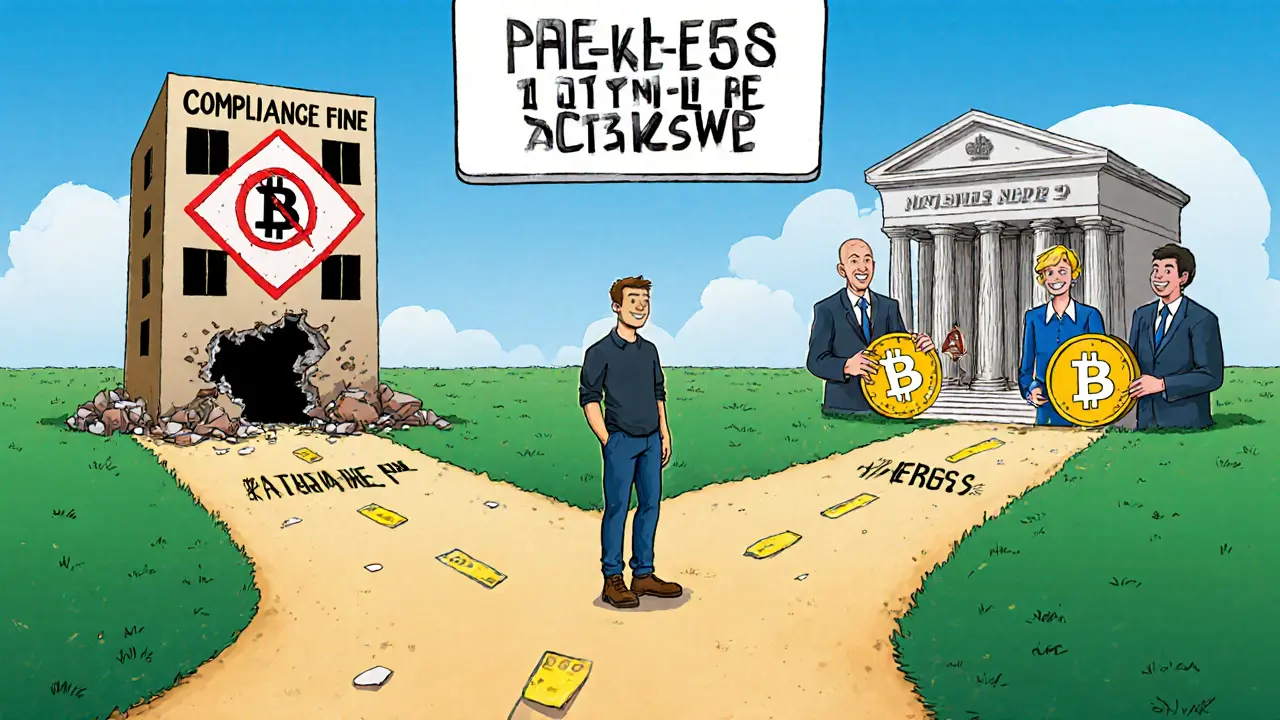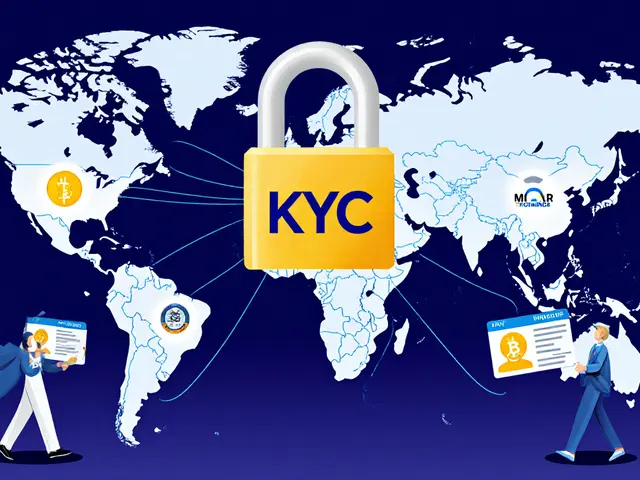KYC/AML Compliance Checker by Country
Find Your Country's Crypto Compliance Rules
Select your country to see specific KYC and AML requirements, penalties for non-compliance, and Travel Rule implementation status.
Compliance Requirements
Key KYC Requirements:
- Verifies identity through government-issued ID and live selfie
- Requires income verification for transactions over $10,000
- Requires address verification for all users
Key AML Requirements:
- Real-time transaction monitoring for suspicious activity
- Reporting of all transactions over $10,000 to FinCEN
- Sanctions screening against OFAC and UN lists
Penalties for Non-Compliance:
By 2025, running a crypto business without strong KYC and AML systems isn’t just risky-it’s impossible. What used to be a gray zone where exchanges could operate with minimal oversight is now a tightly regulated global landscape. If you’re trading, holding, or moving crypto, you’re subject to rules that look more like traditional banking than the wild west of early Bitcoin days. The shift didn’t happen overnight. It was forced by scandals, money laundering cases, and pressure from governments tired of crypto being used to hide illicit funds. Today, compliance isn’t optional. It’s the price of entry.
What KYC and AML Actually Mean for Crypto
KYC stands for Know Your Customer. In crypto, that means verifying who you are before you can deposit, trade, or withdraw. You’ve seen this already: uploading your ID, taking a selfie, answering questions about your income. That’s KYC in action.
AML, or Anti-Money Laundering, is the system behind the scenes that watches your transactions. It flags anything unusual-like sudden large transfers, frequent small deposits from different accounts, or activity linked to sanctioned addresses. If the system spots something odd, it reports it. No exceptions.
These aren’t just suggestions. They’re legal requirements enforced by regulators worldwide. The Financial Action Task Force (FATF), a global body that sets financial crime standards, made it clear in 2019: crypto firms must follow the same rules as banks. By 2025, every major country has adopted this. If you’re a crypto exchange, wallet provider, or even a DeFi gateway that connects users to real money, you’re legally required to do KYC and AML.
The FATF Travel Rule: The Game-Changer
The biggest change since 2020 isn’t just about verifying users-it’s about tracking every transaction. The FATF Travel Rule now forces Virtual Asset Service Providers (VASPs) to share detailed sender and receiver data for transfers over $1,000. That includes names, account numbers, and physical addresses.
Before, you could send crypto from one wallet to another without anyone knowing who was on the other end. Now, if you’re using a regulated exchange, that information gets logged and passed along. Even DeFi platforms that let users swap tokens without an account are being pulled into this. If they interact with regulated entities, they must comply.
This rule isn’t just a U.S. thing. It’s global. The EU, UK, Japan, Singapore, Australia-all have implemented it. The only way to avoid it is to use completely unregulated, non-custodial wallets. But if you ever want to cash out to a bank, you’ll hit a wall. No bank will take crypto from an unverified source.
How Different Countries Handle It
Not all countries enforce KYC and AML the same way. The rules vary, and the penalties for getting it wrong can be brutal.
In the United States, the House passed the GENIUS Act in June 2025, which puts stablecoin issuers directly under the Bank Secrecy Act. That means companies like Circle or Tether now have to verify every user, report suspicious activity, and freeze funds tied to sanctioned individuals. The Treasury’s FinCEN also requires all crypto transactions over $10,000 to be reported, just like cash.
The European Union rolled out MiCAR in December 2024. This law covers everything from stablecoins to utility tokens. Any company issuing or trading crypto-assets in the EU must register with national authorities, run full KYC checks, and submit regular compliance reports. The new Anti-Money Laundering Authority (AMLA) in Brussels now oversees enforcement across all 27 member states, reducing loopholes between countries.
In the United Kingdom, the FCA requires all crypto firms to register and follow strict customer due diligence rules. The Bank of England monitors stablecoins for systemic risk, and HMRC treats crypto as taxable property. Since July 2025, any foreign entity owning UK property through crypto must disclose its real owners. The UK is also testing a digital pound, which will require full KYC from day one.
Japan requires all exchanges to be licensed by the Financial Services Agency. They must keep records for five years and report any suspicious activity within 24 hours. Singapore treats crypto as a financial product and requires firms to prove they have robust AML controls before they can operate. Canada and Australia have similar rules-no exceptions.
Even countries with looser regulations are tightening up. India, Brazil, and Nigeria now require exchanges to collect KYC data and report large transfers. The global trend is clear: no country wants to be seen as a haven for crypto crime.

What Tech You Need to Stay Compliant
Doing KYC and AML manually doesn’t work anymore. With millions of transactions happening daily, you need software that can keep up.
Top crypto firms now use AI-powered tools that do three things:
- Automated KYC verification-upload a passport, take a live photo, and the system checks for forgery, matches your face, and validates your identity in seconds.
- Real-time transaction monitoring-the system watches every incoming and outgoing transfer, flags transactions linked to darknet markets, ransomware wallets, or sanctioned addresses (like those on OFAC’s list), and blocks them automatically.
- Sanctions screening-as governments add new names to sanctions lists, the system updates in real time and checks every user and transaction against them.
Companies like KYC-Chain, ComplyAdvantage, and Elliptic offer platforms that handle multiple jurisdictions at once. They’re not cheap-enterprise systems cost tens of thousands a year-but they’re cheaper than getting fined $50 million like BitMEX did in 2020.
Even small businesses can’t afford to skip this. There are now SaaS tools designed for startups that cost under $500/month. If you’re a crypto startup in 2025 and you’re not using one, you’re already behind.
Why Compliance Isn’t Just a Cost-It’s a Competitive Advantage
Many crypto founders still think KYC and AML are annoying red tape. They’re wrong.
Compliance is now a key differentiator. Banks won’t work with crypto firms that don’t have solid AML systems. Payment processors like Stripe and PayPal won’t integrate with non-compliant platforms. Investors won’t fund companies that can’t prove they’re following the rules.
On the flip side, firms that build strong compliance into their culture attract better users. Retail customers feel safer using platforms that verify identities. Institutional investors demand it. Even regulators now view compliant firms as partners, not threats.
Look at Coinbase. They spend over $300 million a year on compliance. But because of it, they’re the only major U.S. crypto exchange that can offer banking services to customers. That’s not luck-it’s strategy.

What Happens If You Don’t Comply
The penalties aren’t warnings. They’re business killers.
In 2024, the U.S. fined Binance $4.3 billion for failing to implement AML controls. In 2025, the UK fined a crypto broker £18 million for allowing unverified users to move millions in crypto linked to fraud. The EU shut down three DeFi platforms that bypassed the Travel Rule.
It’s not just fines. Your bank accounts get frozen. Your payment processors cut you off. Your customers leave. Your reputation is destroyed. And once you’re on a regulator’s watchlist, it’s nearly impossible to get back in.
There’s no such thing as a "small" crypto business anymore when it comes to compliance. Even a solo operator running a peer-to-peer exchange needs to verify users if they’re connecting to the broader financial system.
What’s Next? The Future of Crypto Compliance
By 2026, expect even tighter rules. Regulators are pushing for global standardization. The FATF is working with the IMF and World Bank to create a unified crypto compliance framework. Countries are sharing data through new international networks.
Central bank digital currencies (CBDCs) will require full KYC from day one. That means the same identity systems used for digital dollars or euros will eventually be used for crypto too.
DeFi is under pressure. Platforms that claim to be "decentralized" but still connect to real money will be forced to add KYC layers. Wallets that don’t comply will be blocked from interacting with regulated exchanges.
The crypto industry’s survival depends on adapting-not resisting. The era of operating in the shadows is over. The winners in 2025 and beyond will be the ones who treat compliance as core to their product, not a legal afterthought.
Is KYC mandatory for all crypto users?
Yes-if you’re using a regulated exchange, wallet, or on-ramp service. These platforms are legally required to verify your identity before allowing deposits, trades, or withdrawals. If you use a non-custodial wallet and never connect to a regulated service, KYC isn’t forced on you-but you won’t be able to cash out to a bank or use most crypto services.
What’s the difference between KYC and AML in crypto?
KYC is about verifying who you are when you sign up. AML is about monitoring what you do after that. KYC checks your ID. AML watches your transactions for signs of fraud, money laundering, or sanctions violations. You need both to operate legally.
Do I need KYC if I’m just holding crypto in my own wallet?
No-if you never interact with a regulated exchange, broker, or payment processor. But if you ever want to sell your crypto for fiat, buy something with it through a merchant, or move it to a service that supports bank transfers, you’ll need to go through KYC at that point.
Can I use DeFi without KYC?
Technically, yes-DeFi protocols themselves don’t require identity verification. But if you use a centralized gateway to buy crypto with a credit card, or cash out to your bank, those gateways will require KYC. Most DeFi users now hit KYC walls at the entry and exit points.
What happens if I lie on my KYC form?
You risk account closure, asset seizure, and legal action. Regulators treat false KYC information as fraud. In the U.S. and EU, it can lead to criminal charges under money laundering laws. Even small lies can trigger investigations that last years.
How do regulators know if I’m not doing KYC?
Blockchain analytics firms track transaction flows between wallets and exchanges. If a wallet linked to a known criminal address sends funds to an unverified exchange, regulators can trace it back. Banks also report suspicious activity. It’s not guesswork-it’s data-driven enforcement.
Are there any countries where KYC isn’t required for crypto?
No major economy allows crypto firms to operate without KYC. Even countries with relaxed rules, like the UAE or Switzerland, require registration and basic identity checks. Some small jurisdictions still have loopholes, but they’re increasingly isolated. Most global platforms refuse to serve them due to banking restrictions.



Brian Gillespie
This is just the new normal. No more hiding behind anonymity. Good.
Ainsley Ross
I appreciate how thorough this breakdown is. The FATF Travel Rule alone has reshaped the entire ecosystem. It's not perfect, but it's necessary. We can't have crypto being the wild west forever.
As someone who works with cross-border payments, I've seen how unregulated flows enable fraud. This isn't about control-it's about protection.
Wayne Dave Arceo
You say 'necessary'-but let’s be precise: this is government overreach disguised as consumer protection. The U.S. doesn't have the moral authority to dictate global standards when our own banking system is riddled with money laundering scandals. FATF is a cartel. And you're applauding it?
Joanne Lee
I find it interesting how the article frames compliance as inevitable, yet doesn't address the privacy trade-offs. If every transaction is traceable, and every identity is verified, what happens when that data is breached-or weaponized?
Is security worth the erosion of financial anonymity? I'm not saying we should return to the wild west, but we must ask: at what cost?
Michael Heitzer
Look, I used to hate KYC. Thought it was corporate fascism. But then I watched a friend lose $200K to a fake exchange that didn't verify users. No recourse. No audit trail. Just gone.
Compliance isn't about control-it's about trust. The people who want crypto to be free? They're not the ones getting scammed. It's the grandma buying Bitcoin on Coinbase. She needs this. We all do.
Stop seeing rules as enemies. See them as guardrails. And yeah, the system's flawed-but it's better than the alternative.
BRYAN CHAGUA
This is one of the clearest summaries I’ve read on crypto regulation in 2025. The part about DeFi gateways being pulled into compliance is especially critical. Most users don’t realize that even if they’re on a ‘decentralized’ platform, if they use a centralized on-ramp, they’re already in the system.
Compliance isn’t the enemy of decentralization-it’s the bridge to legitimacy.
Debraj Dutta
In India, we’ve seen the shift firsthand. Two years ago, exchanges operated in gray zones. Now, every user must submit Aadhaar and PAN. It’s a hassle, yes-but it’s also stopped a lot of scams. People are safer. That’s what matters.
Suhail Kashmiri
lol so now we gotta show our id to buy bitcoin? what a joke. next theyll make us sign a form before we send a satoshi to our mom. this is why i use p2p. no paperwork, no bs.
Kristin LeGard
Oh please. The US is just trying to control crypto because it can’t tax it properly. Meanwhile, the EU is making it impossible for small devs to even launch a token. This isn’t regulation-it’s corporate capture. And you people are cheering?
Arthur Coddington
I used to believe in crypto freedom. Now I just feel like I’m signing a contract with the state every time I open my wallet. It’s not about money anymore. It’s about identity. And I’m not sure I want my financial life tied to my government ID.
Where does it end? Will we need a crypto passport next?
Phil Bradley
I get why people are upset, but let’s be real-most of the ‘freedom’ we had was just chaos. People lost life savings because no one was checking who was behind the scams.
Compliance isn’t sexy, but it’s the only way crypto survives long-term. The real revolution isn’t in anonymity-it’s in access. And you need trust for that.
Stephanie Platis
I'm not opposed to KYC-but the fact that some platforms still allow users to bypass it via peer-to-peer channels? That's a loophole. And loopholes are dangerous. If you're going to regulate, regulate everything. No exceptions. No gray areas. No 'but I'm just holding it in my wallet' excuses. The system is only as strong as its weakest link.
Michelle Elizabeth
It’s ironic, really. We built this whole ecosystem to escape the banking aristocracy-only to recreate it with a new set of gatekeepers. Now, instead of bank managers, we have compliance officers with AI-powered dashboards.
The dream was decentralization. What we got was a beautifully polished prison.
Joy Whitenburg
i just wanna buy eth without sending my drivers license to some random company… but like… i get it. my cousin got scammed last year. she thought she was buying from a legit guy on telegram. turns out he was in nigeria. so… yeah. maybe its kinda necessary. but still. ugh.
Kylie Stavinoha
There’s a philosophical layer here that rarely gets discussed: if we accept KYC as inevitable, are we accepting that financial identity must be tied to state identity? That’s a profound shift-one that redefines what it means to own assets.
Perhaps the real question isn’t whether KYC is necessary, but whether we, as a society, are ready to surrender financial privacy for the illusion of safety.
Diana Dodu
Let’s not pretend this is about safety. It’s about control. The same governments that let Wall Street launder billions through shell companies are now policing a $2 trillion industry because they can’t tax it fast enough.
And you know what? They’re winning. We’re all just playing their game now. Welcome to the new normal.
Raymond Day
I’m not saying KYC is bad… I’m saying it’s a trap. You think you’re protected? Nah. You’re just another data point in a database that will be hacked, sold, or weaponized. And when the government decides you’re a ‘threat’? Your crypto disappears. No trial. No appeal. Just… gone.
Don’t be fooled. This isn’t security. It’s surveillance. 🚩
Noriko Yashiro
I work in fintech in the UK. We spent 18 months building our AML system. It cost half a million. But now, banks actually talk to us. Investors call us first. Customers trust us.
Compliance isn’t the enemy of innovation-it’s the foundation. Without it, crypto stays a niche for the paranoid. With it? We can scale. And that’s worth the hassle.